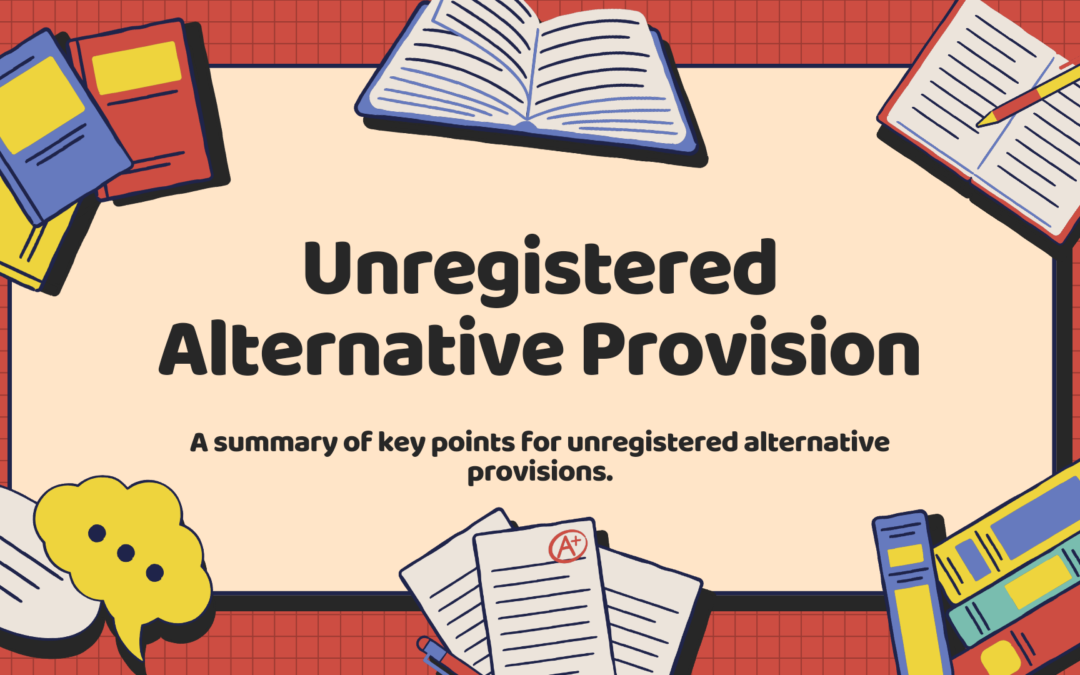In May 2024 the Department for Education published its analysis of the call for evidence completed in September 2022. While it contains lots of interesting analysis of commissioning arrangements at the local authority level, there are also some key take-aways for unregistered alternative providers too. I have tried to summarise the significance of these and provide page numbers for those who do not have the time or patience to cover the 118 page document!
1. The majority of LA commissioners and schools who responded to the call for evidence expressed the view that unregistered AP does not meet the need for academic learning as well as it does other needs such as mental health and social and emotional wellbeing (p.5). Similarly, on p.23 40%respondents described unregistered alternative provision as meeting academic needs as “moderately well”.
This is such an interesting observation because there is a real mix of offers out there from unregistered providers. Some fill a gap by supporting the pupil’s pastoral needs, but define themselves as not providing academic support in the same way as a typical school. Others are focussed on academics with numeracy and literacy embedded within practical activities. Some provide online tutoring which is almost entirely “academic”.
The view from commissioners/schools that unregistered AP less often meets academic needs is one that settings need to challenge if appropriate. This can be done by articulating a clear vision for what they are/ are not, and communicating with confidence about how academic learning is designed, delivered and monitored.
2. There is widespread support for approved lists of unregistered providers across LA
commissioners, schools, and unregistered providers themselves (p.7). There was also, generally, a concern that national standards for unregistered alternative provisions should not be based on existing frameworks such as independent school standards or an existing Ofsted inspection framework.
This is because unregistered APs work well precisely because they are not like schools –
standardisation of curricula or operational approaches would stifle creativity in the ways these settings are led. This could contribute to settings being less successful in getting positive outcomes.
3. The majority of respondents expressed that there is a need for placements in unregistered alternative provision to be either full time or long term, particularly for those with SEND, SEMH needs, school refusers, Looked After children, and those with behavioural issues (p.8). In some ways, this is at odds with the SEND & AP Improvement Plan (2023) which is ideologically oriented towards the idea that school is the best place for (almost) all children.
The DfE’s recent consultation on Strengthening Protections in Unregistered Alternative Provision proposes that EOTAs children could be excluded from the head count requiring independent school registration.
This may help unregistered alternative provisions offer full time/longer term placements, but is likely, at least in the short to medium terms, to increase the numbers of pupils deemed by local authorities as EOTAS – perhaps an unintended consequence as far as the DfE is concerned.
4. There is a gap between the perception of commissioners about the reasons why unregistered provision is commissioned, and the perception of unregistered providers (p.11).
Providers overwhelmingly responded that the reason pupils were with them was “the setting addresses the needs of the young people in ways which cannot be met in a school” whereas more often commissioners thought that it was down to “not enough special school places and “not enough alternative provision school places”.
This highlights that there remains work to be done by unregistered provisions in advocating for what they offer being as good as a maintained school placement and (in some cases) preferable. This is bound up with the observation by some respondents that the term “unregistered” is unhelpful and implies “less than”.

5. Respondents identified a shift in recent years from the reasons unregistered alternative
provision may have been commissioned previously (behavioural issues, pupils excluded from school) to more SEND and in particular, SEMH needs (p.21).
This may be due to the increasing number of children and young people struggling at an earlier age, with problems becoming acute in mainstream settings earlier and earlier.
6. Respondents felt that unregistered alternative provision offered a more holistic approach to maintained options, are that they were more able to support personal development opportunities and maintain engagement with education (p.21).
Respondents cited bespoke curriculums, a personalised approach, and the ability to build strong relationships as contributing factors towards developing young people’s engagement and promoting regular attendance. Small group sizes, vocational learning, online learning, and flexibility in approach were emphasised as key reasons why these settings addressed pupils’ SEMH needs, with particular references to ASC, ADHD and EBSA.
7. Respondents identified local authorities, schools and virtual schools as the main bodies who commission alternative provision for pupils. However, while a number of respondents from commissioning bodies and alternative providers identified that placements were commissioned using a list of approved providers, some raised concerns that it was also commissioned from providers not on an approved list.
It is clear that the practice of commissioning outside of the approved providers list will stop
under DfE plans going forward, so unregistered providers should seek to register via the
approved list mechanism as soon as it is in place.

